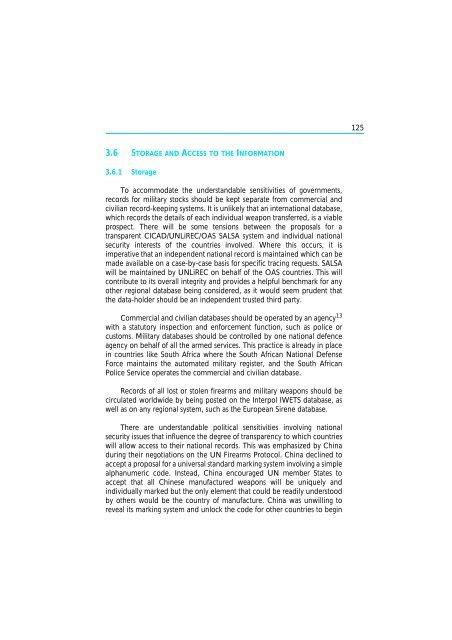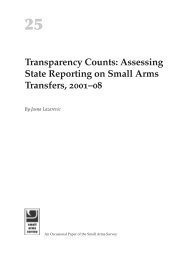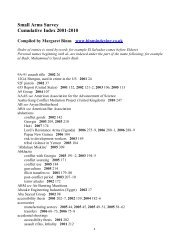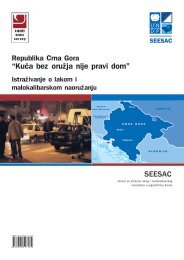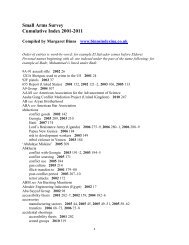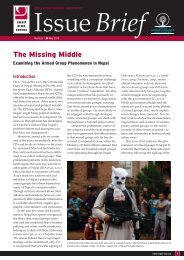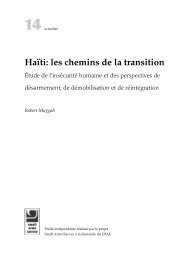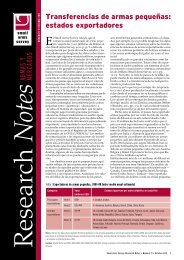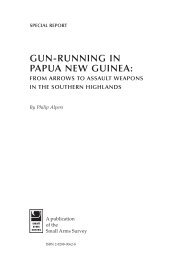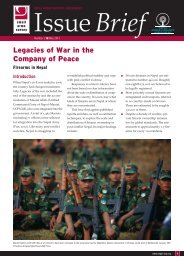The Scope and Implications of a Tracing Mechanism for Small Arms ...
The Scope and Implications of a Tracing Mechanism for Small Arms ...
The Scope and Implications of a Tracing Mechanism for Small Arms ...
You also want an ePaper? Increase the reach of your titles
YUMPU automatically turns print PDFs into web optimized ePapers that Google loves.
125<br />
3.6 STORAGE AND ACCESS TO THE INFORMATION<br />
3.6.1 Storage<br />
To accommodate the underst<strong>and</strong>able sensitivities <strong>of</strong> governments,<br />
records <strong>for</strong> military stocks should be kept separate from commercial <strong>and</strong><br />
civilian record-keeping systems. It is unlikely that an international database,<br />
which records the details <strong>of</strong> each individual weapon transferred, is a viable<br />
prospect. <strong>The</strong>re will be some tensions between the proposals <strong>for</strong> a<br />
transparent CICAD/UNLiREC/OAS SALSA system <strong>and</strong> individual national<br />
security interests <strong>of</strong> the countries involved. Where this occurs, it is<br />
imperative that an independent national record is maintained which can be<br />
made available on a case-by-case basis <strong>for</strong> specific tracing requests. SALSA<br />
will be maintained by UNLiREC on behalf <strong>of</strong> the OAS countries. This will<br />
contribute to its overall integrity <strong>and</strong> provides a helpful benchmark <strong>for</strong> any<br />
other regional database being considered, as it would seem prudent that<br />
the data-holder should be an independent trusted third party.<br />
Commercial <strong>and</strong> civilian databases should be operated by an agency 13<br />
with a statutory inspection <strong>and</strong> en<strong>for</strong>cement function, such as police or<br />
customs. Military databases should be controlled by one national defence<br />
agency on behalf <strong>of</strong> all the armed services. This practice is already in place<br />
in countries like South Africa where the South African National Defense<br />
Force maintains the automated military register, <strong>and</strong> the South African<br />
Police Service operates the commercial <strong>and</strong> civilian database.<br />
Records <strong>of</strong> all lost or stolen firearms <strong>and</strong> military weapons should be<br />
circulated worldwide by being posted on the Interpol IWETS database, as<br />
well as on any regional system, such as the European Sirene database.<br />
<strong>The</strong>re are underst<strong>and</strong>able political sensitivities involving national<br />
security issues that influence the degree <strong>of</strong> transparency to which countries<br />
will allow access to their national records. This was emphasized by China<br />
during their negotiations on the UN Firearms Protocol. China declined to<br />
accept a proposal <strong>for</strong> a universal st<strong>and</strong>ard marking system involving a simple<br />
alphanumeric code. Instead, China encouraged UN member States to<br />
accept that all Chinese manufactured weapons will be uniquely <strong>and</strong><br />
individually marked but the only element that could be readily understood<br />
by others would be the country <strong>of</strong> manufacture. China was unwilling to<br />
reveal its marking system <strong>and</strong> unlock the code <strong>for</strong> other countries to begin


